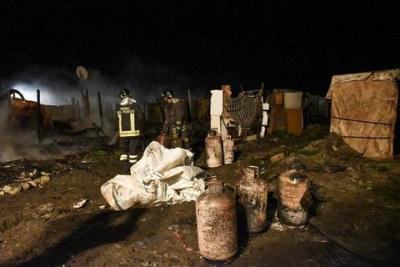Outrage as two migrants killed in fire

FOGGIA -- Two African migrants who are believed to be from Mali, have burned to death in a fierce fire in a shanty town in the countryside outside the southern town of Foggia, police said Friday.
The shanty town was inhabited by hundreds who were employed as pickers on local farms. The blaze Thursday night engulfed numerous huts before the fire department could arrive despite the fact that police were already on the scene having started an eviction on the 1 March.
The fire engulfed an area of 5000 square kilometres and destroyed over 100 huts. By the time fire services could come to terms with the blaze and extinguish it the two bodies had already been found.
The cause of the fire is currently unknown but authorities are not discounting the chance of it being arson. The fire sprang up extremely quickly and quickly burned through the wooden shacks. The damage was compounded by the fact that there were numerous gas canisters used by migrants to cook food.
Two days ago the Dda law enforcement authority had begun a systematic eviction of the slum following a 2016 investigation that showed a sharp rise in crime in the area. Of the 350 inhabitants of the slum a great deal have refused to leave leading to stand-off between the authorities and the camp’s inhabitants. On Thursday, during the day, 200 of the camps inhabitants staged a protest in front of the Foggia prefecture. Their demands were simple; to stay in their current situation and to speak to the authorities.
Perhaps the timing of this fire is a little too coincidental.
In a statement released on Friday afternoon the council released a statement calling for those who come Italy to help the economy to be welcomed. “It is a tragedy for our country. It would be even worse to discover a malicious intent behind it. We are talking about seasonal workers who come to contribute to the well-being of our economy by helping to pick the fruits of our land. They should be treated as such and not as second class workers, as they often are.”


